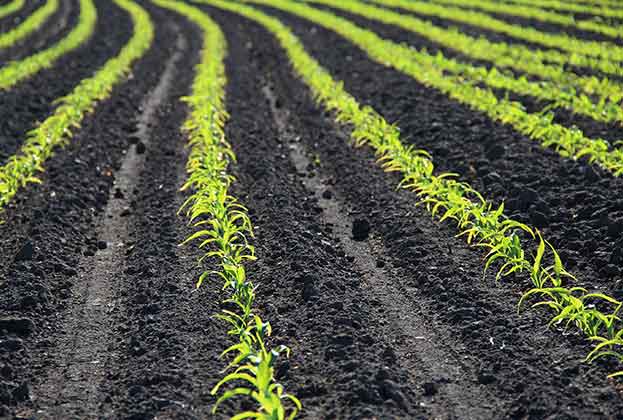Commitments to enhanced environmental standards are becoming common across agri-food supply chains
Increased accountability from supply chains
In its mission to feed everyone cheaply, the UK’s food system has contributed to huge environmental degradation both at home and overseas. The food and drink industry in the UK now accounts for 35% of our domestic greenhouse gas (GHG) emissions, biodiversity on UK farms has fallen to approximately 30% of what it was in 1970 (Defra 2021), and it has been estimated that agriculture is responsible for 60% of the total nitrogen found in England and Wales’ watercourses. Farmers are increasingly required to change their production practices, but remain under financial pressure to sustain yields and output. A lot of attention has been placed on the switch to environmental outcomes in domestic agricultural policy, but in this Spotlight we look at the evolving behaviour of supply chains to the climate and biodiversity crises. We also assess how the situation in Ukraine has exacerbated the need for supply chain sustainability in a financial context.

Taking action
In a recent Deloitte survey, 30% of consumers claimed to have stopped purchasing certain products because of concerns about their sustainability. However, it has become clear that, as we edge further past our planetary boundaries (see chart, below), neither consumer pressure nor voluntary accountability frameworks like the UN’s Sustainable Development Goals (SDGs) are sufficient to impact materially on supply chain behaviours.
To address this, more robust environmental disclosure standards have been introduced. All large companies will be required to report on their climate-related impact through the Taskforce on Climate-Related Financial Disclosures (TCFD) by 2023, with a similar system for nature to follow soon after. Any listed business with exposure to climate or nature risk now needs to disclose that risk. Disclosure means these businesses become less desirable to investors, driving exposed companies to reduce their negative environmental and social impacts. While these regulations are unlikely to apply directly to farming businesses due to their size, many food processors, retailers and some landowners will be impacted. Food company commitments to enhanced environmental standards are consequently becoming increasingly common, as shown by Nestle’s commitment to source 50% of its key ingredients from regenerative agricultural systems by 2030 and by Morrisons’ pledge to be completely supplied by net zero carbon British farms by 2030.
The future of accreditation
For farmers, the role supply chains currently have in dictating farm practices has been limited. Red Tractor is the dominant assurance scheme with around 50,000 farmers taking part, but it has minimal additional requirements over the regulatory baseline. Enhanced environmental standards, such as RSPCA Freedom Foods, organic certification, and Pasture for Life, have been developed over time to add market value to farmers’ produce, implying that shorter supply chains offer higher standards of environmental assurance.
Despite high profile shifts to higher standards, Defra’s Farm Practices Survey in 2021 suggested that 33% of farmers do not consider GHGs to be a relevant issue for their farm
Nicola Buckingham, Associate Director, Rural Research
In 2021, Tesco announced it would raise its ambition and require all 14,000 of its fresh produce suppliers to achieve LEAF Marque accreditation. Despite high profile shifts to higher standards, Defra’s Farm Practices Survey in 2021 suggested that 33% of farmers do not consider GHGs to be a relevant issue for their farm, and only 56% of farmers are currently taking action to reduce their climate impact. So the question is, will supply chains rapidly increasing accountability pressures impact on farmers in the years to come?
Labelling
According to Deloitte, 46% of customers want more clarity on the origins of products. Retailers are reluctant to tell customers what they should and shouldn’t be buying. However, consumers need access to enough product information to make informed purchasing choices. Ecolabels, which provide information on the environmental impact of products, have been proven to positively influence consumers’ product purchase behaviour. There are as many as 28 different types of ecolabel in use within the UK, painting a confusing picture for time-pressured shoppers.
Rising expectations
We look at the possible impact on UK farmers
To assess the impact of rising expectations on farmers, Savills Rural Research collated a list of 100 of the largest food companies that purchase UK grown produce and mapped these businesses to the main primary production types in the UK – arable crops, vegetables, eggs, dairy and meat. A desktop study was undertaken to provide an indication of the action being taken around sustainability commitments within the sector. Our research focused on these large food companies and used websites and open-source data.
Sustainability commitments
We analyse the progress being made to address farm-based emissions
.jpg)
The dairy sector has made great progress in addressing environmental impacts
Analysis by turnover of the 100 largest food businesses suggests that bigger companies have more advanced environmental commitments. 26% of the companies analysed state that they actively support the TCFD. A higher percentage are likely to be reporting in line with TCFD requirements, but may not have published this on their website. Companies with a UK premium listing of their equity shares have been subject to TCFD-aligned reporting since 2021, and this requirement is now being extended to other companies. Increasing requirements for enhanced disclosure play a significant role in changing behaviours.
Our research reveals that eleven of the largest supermarkets in the UK all have a sustainability strategy that they report on. Ten out of the eleven supermarkets are aligned with the SDGs and they all have emissions reduction targets. 73% of supermarkets we analysed have sustainability groups for farmers, and 91% of these supermarkets are engaging in some way to reduce farm-based emissions within their supply chain. The majority (64%) of them provide some detail about how they aim to achieve their sustainability commitments.
The dairy sector arguably has made the greatest progress in addressing environmental impacts as a result of its short value chain, exclusive contracts at farm level and the worldwide focus on the climate impact of ruminants. Our analysis shows that of the total UK milk field, at least 55% by volume is purchased by a processor with a set emissions reduction target, and at least 60% of the milk is produced by farmers working with their buyers to reduce greenhouse gas emissions. Nestlé and Arla are pioneering methods of working with farmers to reduce environmental impacts, with the key questions being to what extent farmers will be expected to offset actions at farm level and whether farmers will be rewarded fairly for doing so.
Future strategies
Our research shows the breadth of commitment to sustainable practices within the UK's primary production footprint. We found that the more disaggregated the supply chain (the greater number of steps between farmer and end consumer), the harder it is to track sustainability commitments. Despite 62% of the companies we analysed having a sustainability strategy, only 19% provided specific detail of how they intend to increase sustainability at farm level. It is also clear that the lack of transparency between consumers and producers is inhibiting accountability for (and investment in) environmental sustainability. For farmers, the imperative should be to create the information on enhanced environmental practices at farm level, but it seems likely they will wait to be told by supply chains what data they need to provide.
A key question is whether farmers will be properly incentivised to increase the sustainability of their production, or whether it will become a condition of market access to do so. This tension highlights the broader issue of how farmers can retain value and agency within supply chains. There is a cost to creating more sustainable production, and it is not yet clear who will bear that cost.
Read the articles within Spotlight: Agri-food sustainability below.


